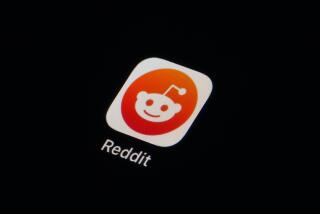Broadcom Stock Fetches Double Projected Asking Price in IPO
- Share via
In what could become one of California’s hottest stock offerings in recent years, shares of Irvine-based Broadcom Inc. fetched $24--double the projected asking price--in an initial public offering Thursday.
The sale raised $78.1 million for the maker of high-speed semiconductor products and five key shareholders, including co-founders Henry T. Nicholas III and Henry Samueli, who became mega-millionaires.
“The Henrys,” as Broadcom employees call them, netted almost $6.5 million each. Samueli and Nicholas each retain a 28% stake in the company, worth a combined $536.8 million--$268.4 million apiece.
The stock is expected to soar as public trading begins on the Nasdaq market today.
“It is going to be sizzling, no question about it,” said Manish Shah, publisher of IPO Maven. “The stock could trade as high as $60 in the next three months, considering what has happened in the last three months with Internet IPOs.”
Broadcom’s technology is used in modems for Internet access.
Internet stocks are a new Wall Street darling. Shares of Exodus Communications Inc., an Internet systems manager, rose 84% in first-day trading last month, as did network security provider ISS Group Inc.’s shares. Other Internet stocks have taken off in the last week, after the Web search engine firm Yahoo Inc. posted unexpectedly high earnings.
Only six of the 234 companies that have gone public in California since the start of 1995 have been priced at $24 or more per share. Broadcom originally had planned to price its shares at $10 to $12, but interest in the company by large institutional investors in recent weeks doubled the asking price.
Brokerages underwriting Broadcom’s offering acquired 3 million shares Thursday and will begin trading them this morning. An additional 500,000 shares were purchased at the offering price by networking products maker Cisco Systems Inc.
The sale put Samueli, Nicholas and their company in the same class as hot properties like sunglass maker Oakley Inc. and computer memory-chip maker Kingston Technology Corp. of Irvine.
Foothill Ranch-based Oakley went public at $23 a share in August 1995, netting founder Jim Jannard $139 million cash. He hung onto 65% of the company’s stock, which was worth $531.6 million on opening day, although its value has slipped considerably since then. Oakley, under siege by the competition, closed at $12.19 a share on the New York Stock Exchange on Thursday, down about 46.5% from the opening day price.
Kingston didn’t go the public offering route. Instead, founders David Sun and John Tu sold an 80% share of the company to Japan’s Softbank Corp. last year for a staggering $1.5 billion.
Their net worth, with the shares they kept, is estimated at $900 million each--and that’s after they awarded employees $100 million worth of bonuses.
Shah, who closely tracks IPOs, said he believes Broadcom shares will soar, but that “people should not forget that many other expected leaders have fizzled.” Broadcom “could be back at around $10” in six months or so, he said. “The possibility is definitely there.”
For now, though, things are looking up.
Broadcom announced late last month that it had signed an agreement to provide Chicago computer products maker General Instrument Corp. with high-speed chips for up to 15 million set-top boxes that will connect the new generation of digital television sets to the Internet and other services.
Nicholas and Samueli both came from Tustin-based PairGain Technologies Inc., a company that develops communications products that improve the efficiency of copper wire transmission.
The two electrical engineers, who started Broadcom in 1991, could not be reached for comment.
The company lost $1.2 million on sales of $37 million last year.
Broadcom has financed itself largely from operating revenue, so the founders and other executives and employees own most of the stock. Nicholas and Samueli each sold 290,000 shares and each still owns 11.2 million more.
Several major customers, including Intel Corp., Scientific-Atlanta Inc., General Instrument and, now, Cisco Systems, also own small stakes in the firm.






